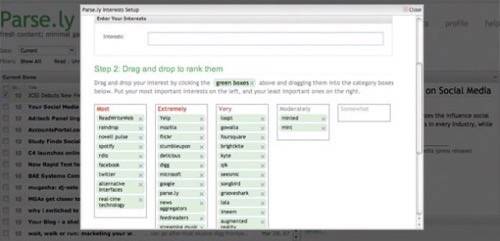Bloggers, muckrakers and news fanatics, lend me your ears. It’s entirely possible that we’ve discovered one of the best approaches to media monitoring since RSS itself. My mother always said, “You’ll never get what you want unless you ask.” But with adaptive feed application Parse.ly, that simply isn’t true. Rather than forcing us to abandon our overflowing feed readers, Parse.ly records our preferences and learns to work with us.


The problem with most feed readers is that they’re controlled by humans – namely, us. As curators of the Web, we collect disparate links in Jekyll and Hyde-like bouts and then forget to maintain our feeds. It’s totally understandable. Over time and depending on our moods, our interests change. Years ago the term “social media” may have seemed as futuristic as robotic exoskeletons and citizen space travel. Today, if you’re naive enough to add “social media” as one of your feed-related interests, you’re likely to drown in a river of presentation posts. Parse.ly hopes to change that.
To begin, Parse.ly asks users to enter the topics they’d like to read about. From here you use a drag-and-drop interface to determine your level of interest around each topic. Your favorite topics go into a “Most” interested box, while your fleeting fancies are labeled as “Somewhat” interesting. From here, the system scores and compiles your reading list based on relevancy. As you star, unstar and delete items, Parse.ly learns your preferences and acts accordingly. For those of us suffering from information overload, this is a great way to get back on track. Rather than having to go through each and every subscription, users can either ignore articles or take an active role in removing or demoting an interest. What’s more, the fact that this system is adaptive means that based on keyword matching, it might just serve you some unknown gems.
Parse.ly is currently in closed beta and is expected to launch in 2010. If you’d like to try the service, register for an invitation at parse.ly.
Parsely Tour from Sachin Kamdar on Vimeo.





















